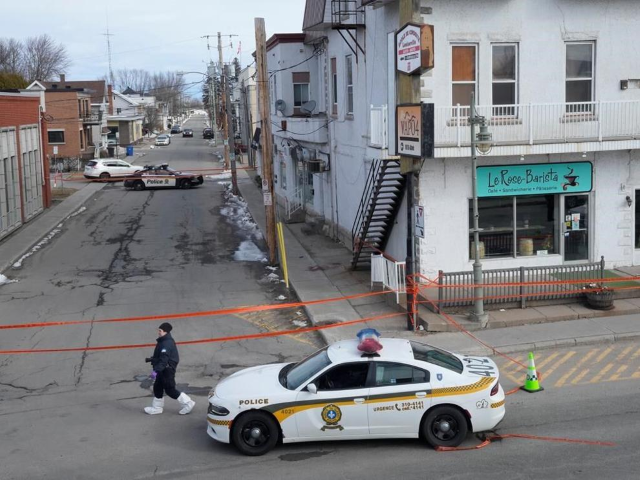
Police tape cordons off the scene after a Quebec provincial police officer was killed while trying to arrest a man in Louiseville, Que. on March 28, 2023. THE CANADIAN PRESS/Ryan Remiorz
In Montreal, officers involved in a fatal police operation last March, which resulted in the deaths of a Quebec provincial police sergeant and her assailant, provided heartfelt testimony on Wednesday, recounting the tragic events.
William Berrouard, a patrol officer with the Quebec provincial police, recounted his shock when Isaac Brouillard Lessard attacked him with a knife during an attempt to arrest him for making threats and violating probation.
The incident occurred on March 27, 2023, when Brouillard Lessard seriously injured Berrouard and fatally stabbed Sgt. Maureen Breau before being shot dead by police in his Louiseville apartment building, approximately 100 kilometers northeast of Montreal. Berrouard described the attack as sudden, recalling how he was reading Brouillard Lessard his rights when he was unexpectedly stabbed in the head. He expressed uncertainty about the severity of his injuries, stating, "I didn't know if I was dying."
Taking cover behind a mattress in the hallway, Berrouard heard his colleagues open fire, ultimately killing Brouillard Lessard.
Another officer, Constant Perreault, shared his experience, noting that he had been standing next to the apartment door with Berrouard when he saw Brouillard Lessard reach for something behind the door. Reacting instinctively, Perreault moved away, reflecting on how his decision likely saved his life. He expressed lingering questions about whether he could have done anything differently.
Perreault recounted hearing Berrouard's cries for help and witnessing Breau being stabbed as he sought refuge in a stairwell. Alongside fellow officer Frédérique Poitras, Perreault fired at Brouillard Lessard, ending the threat.
Berrouard, while not witnessing Breau's stabbing, joined Poitras in assisting her outside. He vividly recalled pleading with Breau to stay conscious as he tended to her injuries amidst his own. His emotional testimony highlighted the chaos and urgency of the situation.
Berrouard revealed that he and three other officers had visited Brouillard Lessard's apartment three days earlier, following reports from his parents about his declining mental health. Despite deeming him non-threatening during this visit, the officers faced a drastically different situation during the arrest attempt.
Acknowledging the prior encounter likely influenced his approach, Berrouard admitted to feeling a false sense of confidence. This revelation sheds light on the complexities and uncertainties officers face when dealing with individuals experiencing mental health crises.
Previous findings revealed Brouillard Lessard's history of mental illness and interactions with the mental health review board. Despite this, he had not been deemed an imminent threat during the initial visit.
Contrary to earlier criticism from workplace health and safety inspectors, the officers defended their actions, stating that they had exchanged information and devised a plan based on available information. Poitras emphasized that they did not anticipate the use of a knife and approached the arrest as they would any other.
The officers' testimony provides a poignant insight into the challenges and split-second decisions officers face in high-pressure situations. As the inquiry continues, the tragic incident underscores the need for ongoing evaluation and support for law enforcement dealing with mental health-related calls.















